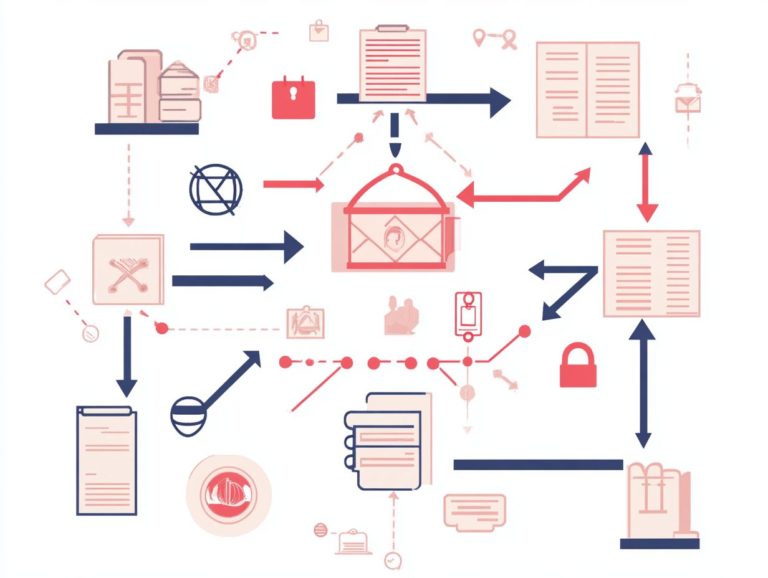What Are the Ethical Considerations in IP Law?
Intellectual property (IP) law is essential for protecting creators’ rights and encouraging innovation.
However, the ethical aspects of IP are often overlooked, leading to important questions about fairness, access, and responsibility.
This article explores the balance between protecting creators’ rights and ensuring public access to knowledge. It looks into issues like digital piracy, gene patenting, and the ethical responsibilities of IP professionals, providing an overview of the ongoing debates in this critical field.
Contents
- Key Takeaways:
- Ethical Issues in IP Law
- Current Issues and Debates in IP Law
- Ethical Guidelines for IP Professionals
- Code of Conduct for IP Lawyers and Agents
- Responsibilities of IP Offices and Agencies
- Preguntas Frecuentes
- Cu les son las consideraciones ticas en la ley de propiedad intelectual?
- Por qu es importante considerar la tica en la ley de propiedad intelectual?
- Cu les son algunos problemas ticos comunes en la ley de propiedad intelectual?
- C mo promueve la ley de propiedad intelectual el comportamiento tico?
- Qu papel juegan las leyes internacionales en la propiedad intelectual?
- Cu les son las consecuencias de no considerar la tica en la propiedad intelectual?
Key Takeaways:

- IP law protects the rights of creators while ensuring innovation and access.
- Key ethical considerations include fair use, copyright infringement, and digital piracy.
- IP professionals, like lawyers and agents, must follow a code of conduct to maintain ethical practices in the industry.
What is Intellectual Property?
Intellectual property (IP) includes legal tools such as copyrights, patents, trademarks, and industrial design rights. These tools give you exclusive control over your creative works and inventions. This legal framework safeguards your rights and fosters an environment that encourages creativity and innovation.
Understanding IP is crucial for navigating complex legal situations, especially in academia and business.
These forms of IP are vital for ensuring you benefit financially from your hard work, promoting further research and development. For instance, patents allow pharmaceutical companies to own the rights to a drug’s formula for a specific time, giving them a competitive advantage.
Trademarks are also critical for biotechnology firms, helping them protect their brand in a crowded market. A strong IP system not only defends your creations but also stimulates economic growth by attracting investments and promoting innovation across various industries.
Why Ethics Matter in IP Law
Ethics are central to intellectual property law, shaping corporate responsibility and guiding the standards you should follow in protecting creators’ rights.
The overlap of IP and ethical issues raises moral dilemmas, especially regarding access to knowledge and healthcare. Ethical licensing is essential to ensure that creators’ rights are honored while balancing public interest and human rights.
In today s fast-paced economy, navigating these ethical challenges is tricky, especially in industries like pharmaceuticals. You often have to choose between securing patents and keeping your products affordable for the communities that need them most.
The discussions around essential health technologies, like life-saving medications, highlight the urgent need to rethink intellectual property standards. We must urgently find a middle ground that protects corporate interests while ensuring equitable access to vital resources.
This balance is critical for addressing real-world issues, including public health emergencies and funding disparities in healthcare.
Ethical Issues in IP Law
Ethical issues in intellectual property law focus on the moral rights of creators, benefit-sharing, and addressing social inequalities in knowledge access.
By understanding these ethical guidelines, you can help prevent the exploitation of knowledge and ensure that innovations benefit everyone rather than just a few.
The complexity of these ethical challenges becomes even more evident in biotechnology, where scientific advancements often raise questions about traditional knowledge and indigenous practices.
In conclusion, we must think critically about how we approach intellectual property. Consider advocating for ethical IP practices to promote a fairer system for everyone.
Protection of Creators’ Rights
The protection of creators’ rights lies at the heart of intellectual property law, enabling you to maintain moral rights over your works. This allows you to reap the benefits of copyright and patent protections.
This legal framework not only safeguards your creations but also fosters new ideas by granting you exclusive rights. This encourages you to invest your time and resources into product development and creative expression.
The relationship between moral rights and exclusive rights raises important questions about the long-term implications for societal benefits and the public domain.
In industries like pharmaceuticals, patent laws are essential. They allow companies like yours to protect inventions for a limited time, leading to groundbreaking medications that enhance public health.
However, this exclusivity can inflate costs, making lifesaving drugs less accessible for those who need them most. Copyright laws protect artists, musicians, and authors, ensuring you receive fair compensation for your work.
These protections promote innovation and artistic expression, but it’s crucial to balance them with the concept of public access. This conversation is vital! It shapes how we nurture creativity and serve the public.
Balancing Innovation and Access

Balancing innovation and access is one of the most significant challenges you ll encounter in intellectual property law, especially in biotechnology and pharmaceuticals. Here, market control and monopoly practices can severely impact healthcare accessibility.
Achieving a fair balance means navigating the dual-use potential of scientific advancements. It s crucial for you, as policymakers and industry leaders, to consider the public interest to ensure that the benefits of innovation are equitably shared throughout society.
This dilemma becomes glaringly obvious with life-saving medications that remain prohibitively expensive for many. It creates a distinct divide between those who can afford treatment and those who cannot.
Take, for instance, groundbreaking gene therapies that have ushered in remarkable advancements. Their exorbitant costs often leave marginalized populations without access.
Exploring regulatory frameworks that advocate for ethical licensing could pave the way for a more collaborative approach. By encouraging partnerships between innovators and public health entities, you can help widen availability.
Such initiatives enhance the public good and ensure that innovation thrives inclusively and sustainably.
Fair Use and Copyright Infringement
Fair use is a key part of copyright law. It lets you use limited amounts of copyrighted material without asking for permission. This concept significantly influences copyright infringement and legal protection.
Understanding the nuances of fair use is essential for you and your organization as you navigate the intricate legalities of copyright in our increasingly digital landscape. Fair use encompasses specific scenarios like commentary, criticism, news reporting, teaching, and scholarship.
Using copyrighted material in these contexts can bring societal benefits. For example, when a film critic references clips from a movie, that could qualify as fair use since it enriches broader discourse.
On the flip side, unauthorized reproduction of an entire book would likely cross the line into copyright infringement. Creative Commons plays a crucial role in this arena by providing adaptable licenses that encourage sharing while addressing ethical concerns about ownership.
This shift toward more accessible content fosters innovation and collaboration, all while upholding the fundamental principles of copyright protection. Join the movement to ensure healthcare innovations reach everyone!
Current Issues and Debates in IP Law
Intellectual property law faces challenges from digital piracy and gene patenting in biotechnology.
These issues require a re-evaluation of existing laws to ensure a fair balance between innovation and public access.
Stakeholders need to engage in meaningful discussions to find solutions respecting both creators’ rights and society’s needs.
Digital Piracy and Online Copyright
Digital piracy is a serious challenge that creates ethical dilemmas for creators and consumers.
As technology evolves, content becomes more accessible, leading to increased copyright infringement.
Addressing piracy requires a balanced approach that protects creators while allowing public access to knowledge.
Creators must safeguard their work in a digital age where duplication is easy, impacting their earnings.
Consumers often justify piracy due to a lack of awareness about its consequences.
Robust solutions like blockchain for ownership tracking could lead to a fairer digital ecosystem.
Collaboration between industry players and policymakers can create effective regulations to uphold rights and accessibility.
Gene Patenting and Biotechnology
Gene patenting raises important questions about intellectual property rights and healthcare access.
Patenting genes can hinder research and limit access to vital health technologies.
Finding the right balance is essential for encouraging innovation while keeping advancements accessible.
With personalized medicine on the rise, the impact of gene patents is even more profound.
The case of Myriad Genetics and their patents on BRCA1 and BRCA2 genes sparked significant debate.
While their patents led to investment in genetic testing, many women faced high costs and limited choices.
In contrast, open-source initiatives that don t patent often promote collaboration and improve access to treatments.
This highlights the ethical duty of biotech companies to protect their innovations while considering the societal impact of their patents.
Ethical Guidelines for IP Professionals

Creating ethical guidelines for IP professionals is essential for maintaining integrity in intellectual property law.
These guidelines serve as a code of conduct, outlining responsibilities and ethical standards for navigating IP rights.
By following these principles, you protect creators interests and foster trust within the IP ecosystem.
Code of Conduct for IP Lawyers and Agents
The code of conduct for IP lawyers and agents outlines the ethical responsibilities you must uphold in your legal representation of clients. This ensures adherence to both legal and moral standards.
This framework is essential for navigating the complexities of intellectual property law, particularly concerning ethical licensing and protecting creators’ rights.
Establishing a robust ethical foundation fosters trust and accountability among stakeholders. Following these guidelines safeguards your clients interests and contributes to a fairer legal environment.
For instance, you are expected to avoid conflicts of interest. Ensure your loyalty remains firmly with the client.
Best practices involve carefully checking all the details and openly disclosing any potential biases that may influence your judgment.
Maintaining confidentiality is crucial; you must protect sensitive information to maintain the integrity of the legal process. Ultimately, these ethical standards safeguard individual rights and promote a fair marketplace, encouraging innovation across the field.
Responsibilities of IP Offices and Agencies
Your responsibilities as an IP office or agency go beyond mere administration. You play a crucial role in promoting corporate accountability and safeguarding the public interest in the intricate world of intellectual property law.
You must enforce ethical standards, manage patent rights, and ensure that the legal framework fosters innovation while addressing social inequalities and accessibility to knowledge.
Your influence is vital in shaping a balanced IP landscape that benefits both creators and society.
By meticulously examining patent applications, you can prevent the approval of overly broad patents that stifle competition and hinder innovation.
Collaborating with stakeholders raises awareness about the importance of protecting creators’ rights, helping to cultivate a culture of respect for intellectual property.
Implementing transparency measures and comprehensive guidelines encourages corporations to uphold ethical practices. This ensures that inventors and artists receive the recognition and compensation they deserve.
This balanced approach enhances corporate accountability, promotes creativity, and broadens access to diverse knowledge resources for the public.
Preguntas Frecuentes
Cu les son las consideraciones ticas en la ley de propiedad intelectual?
Las consideraciones ticas en la ley de propiedad intelectual se refieren a los principios y valores que rigen el uso y la protecci n de la propiedad intelectual. Estas consideraciones incluyen equidad, transparencia y respeto por los derechos de los creadores y propietarios de la propiedad intelectual.
Por qu es importante considerar la tica en la ley de propiedad intelectual?

Considerar la tica en la ley de propiedad intelectual es importante porque asegura el trato justo y equitativo de los creadores y propietarios de la propiedad intelectual. Tambi n promueve la innovaci n y la creatividad mientras protege los derechos de los creadores originales.
Cu les son algunos problemas ticos comunes en la ley de propiedad intelectual?
Algunos problemas ticos comunes en la ley de propiedad intelectual incluyen la infracci n de derechos de autor, el plagio y el uso no autorizado de la propiedad intelectual sin la debida atribuci n o compensaci n. Tambi n se presentan problemas como la explotaci n del conocimiento ind gena y las expresiones culturales sin el debido consentimiento o reconocimiento.
C mo promueve la ley de propiedad intelectual el comportamiento tico?
La ley de propiedad intelectual promueve el comportamiento tico estableciendo est ndares y regulaciones para el uso y la protecci n de la propiedad intelectual. Tambi n proporciona consecuencias legales para aquellos que violan estos est ndares, disuadiendo as las pr cticas poco ticas.
Qu papel juegan las leyes internacionales en la propiedad intelectual?
Las leyes internacionales son clave en la propiedad intelectual. Proporcionan un marco para abordar problemas que cruzan fronteras.
Promueven la cooperaci n internacional en la protecci n de la propiedad intelectual.
Cu les son las consecuencias de no considerar la tica en la propiedad intelectual?
No considerar la tica en la propiedad intelectual puede afectar negativamente a los derechos de los creadores. Tambi n puede resultar en problemas legales que afectan a todos y da ar la reputaci n de las personas o empresas involucradas.






